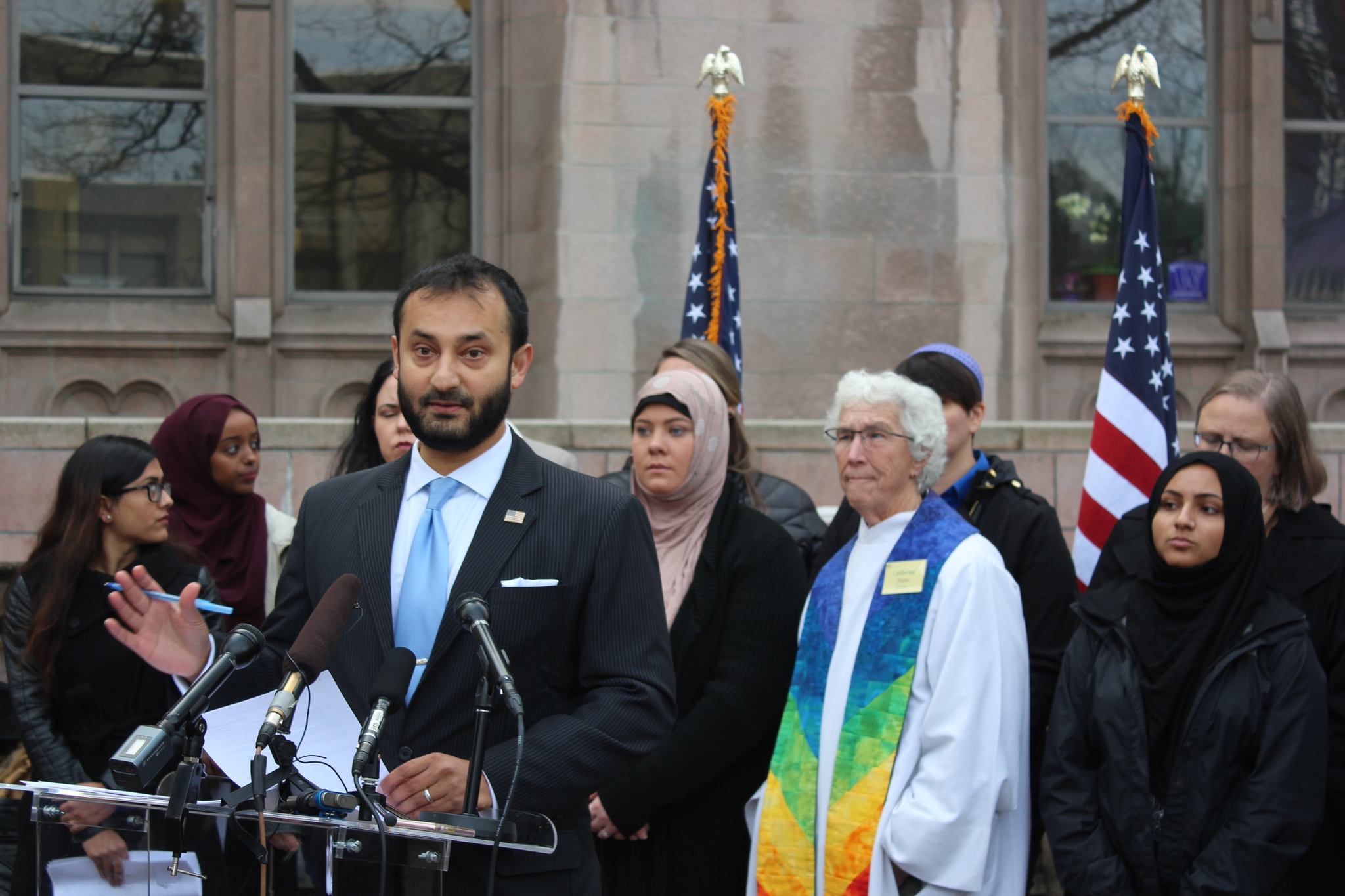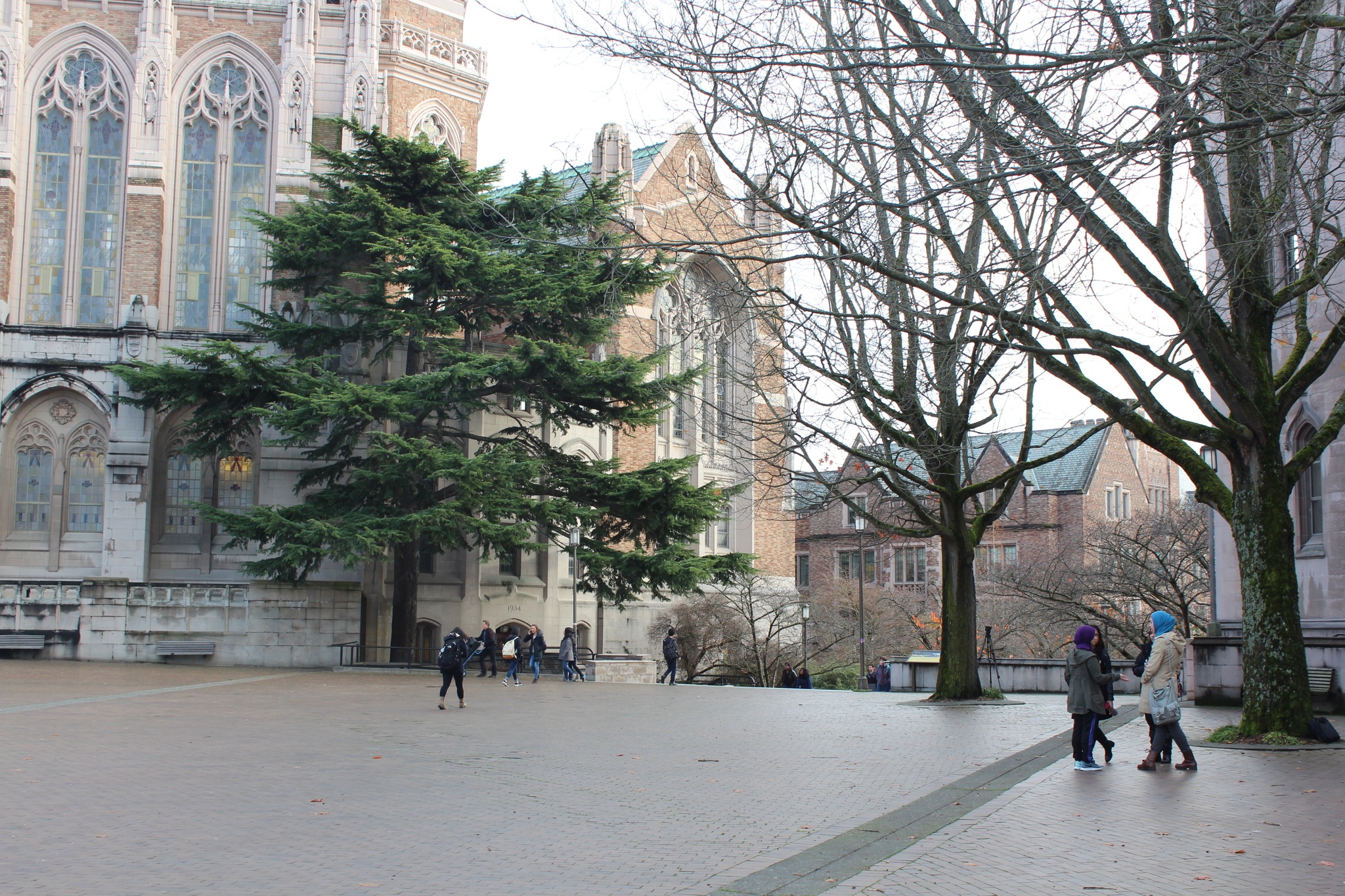Around 5:45 p.m. on November 15, a Muslim student was smashed in the face with a glass bottle near the northeast entrance to Mary Gates Hall on the University of Washington campus, according to a UW police report.
The suspect, who the female victim described as male, in a black sweatshirt, hit her on the right cheek near her eye, then fled, taking the bottle with him. She was in too much pain to provide police with a written statement immediately, but, as was announced during a press conference Monday at UW’s Red Square, she suffered heavy bruising, swelling, and a concussion. The young woman was wearing a headscarf at the time of the attack. The UW police investigation is ongoing.
The Council on American-Islamic Relations-Washington (CAIR-WA) say it’s clear that the assault could be a hate crime — in part thanks to the spate of anti-Muslim attacks in this state and across the country in 2015 and 2016. But the UW incident is not necessarily being investigated as one. No campus alerts were issued following the attack, and there were no public call-outs from UW officials asking students and staff if they’d seen anything that night.
“We really want to figure out what happened and why,” said CAIR-WA executive director Arsalan Bukhari on Monday during a press conference CAIR-WA organized in reaction to what it perceives as an ineffective initial response from UW authorities. “The first thing we wanted to have happen was for the police department to send an immediate notification out to the public and the campus [student] body, saying that something like this had happened, and that if they had seen anything they should come forward and report, so that person can be caught,” said Bukhari in an interview following the press conference. “And that hasn’t happened yet. That’s why we wanted to put this public call out today. We really want to make sure this is taken seriously.”
According to Bukhari and FBI data, 2015 saw the highest number of reported anti-Muslim hate crimes in U.S. history. Every single day last year, some CAIR office received one or two reports, on average, of an anti-Muslim attack or threat. “Many of the victims were Muslim women who wear headscarves,” Bukhari said, “or Sikh-American men, who are not Muslim, but wear turbans and have beards, and that makes them appear Muslim.” With that as a backdrop, a sudden attack against a young woman in a headscarf is very, very serious. CAIR-WA is calling for an FBI investigation into the matter and is offering a $5,000 reward for anyone able to give information about the attack that could lead to an arrest.
There’s no doubt that feelings of frustration, anger, fear, and disbelief surged during the Donald Trump presidential campaign and post-election, particularly among Muslim and immigrant communities. The president-elect and several potential cabinet members have signaled that a national Muslim registry is an actual possibility. In a city where a mere 8 percent of votes went to Trump, some might imagine this kind of crime — if it has anything to do with the recent national rhetoric, that is — couldn’t happen here. But it does.
There have been at least 25 local hate crimes and threats reported to CAIR-WA in 2016, including death threats, beatings, and vandalism (a Redmond mosque’s granite sign was smashed just last week). In fact, on the same day this UW student was assaulted — November 15 — a group of Muslim women were harassed on UW Bothell campus, too, for wearing hijabs. Bukhari says this caused “waves of concern among Muslim students who wear headscarves on the UW Bothell campus, who then heard about this [attack].”
Mina Sultana, co-president of the Muslim Students Association at UW Seattle, says she was shocked when the Middle Eastern Student Commission director informed her and some peers about the attack shortly after it occurred on November 15. “I had her repeat it two or three times,” she says. “I couldn’t believe this had happened. I had walked through this same place maybe 30 minutes before! To think that something like that could happen on our campus… it’s pretty frightening.”
The following morning, Sultana says, she and presidents of other campus organizations with large Muslim populations put warnings out on email and social media, letting people know about the incident and pointing them to campus safety resources — something that the UW, as a whole, did not do, which, as Sultana told the crowd during the press conference, was “frustrating.”
According to CAIR-WA, the group asked UW police chief John N. Vinson why he’d issued no public alerts, and he said his department uses a campus safety law called the Jeanne Clery Act to determine the need for one. Bukhari said at the podium that “we think this is a discretionary item” and CAIR-WA remains unconvinced that this particular assault did not merit a public announcement.
Now, however, the UW has made one. “The University of Washington condemns the attack against a Muslim student earlier this month in no uncertain terms,” said UW president Ana Mari Cauce in a statement released Monday. “We continue to offer support to the student and we stand with the Muslim community here today and all who oppose any form of bigotry, harassment, or hate.” She went on to confirm that the UW police investigation of this crime is ongoing, and that she did issue a broad message to all UW campuses on November 17, noting that there had been “several reports of harassment, vandalism, and violent incidents” in Washington state and on UW campuses following Trump’s election. “Our University is unwavering in its resolve to create an inclusive, diverse and welcoming community,” the message concludes.
Sultana says that to her knowledge, a potentially bias-motivated attack like this at UW is new. “We’ve had verbal harassment and vandalism, but this is a whole new level, I think. It’s something we haven’t seen yet and it’s terrifying.”
She adds that, in a vague sense, there has certainly been fear and anxiety among the Muslim student community after November 8. But “the fact that it happened on our campus makes it real.” Now, “It’s not just something you see or hear on the news; it’s something that happened on our campus to someone that we know.”









